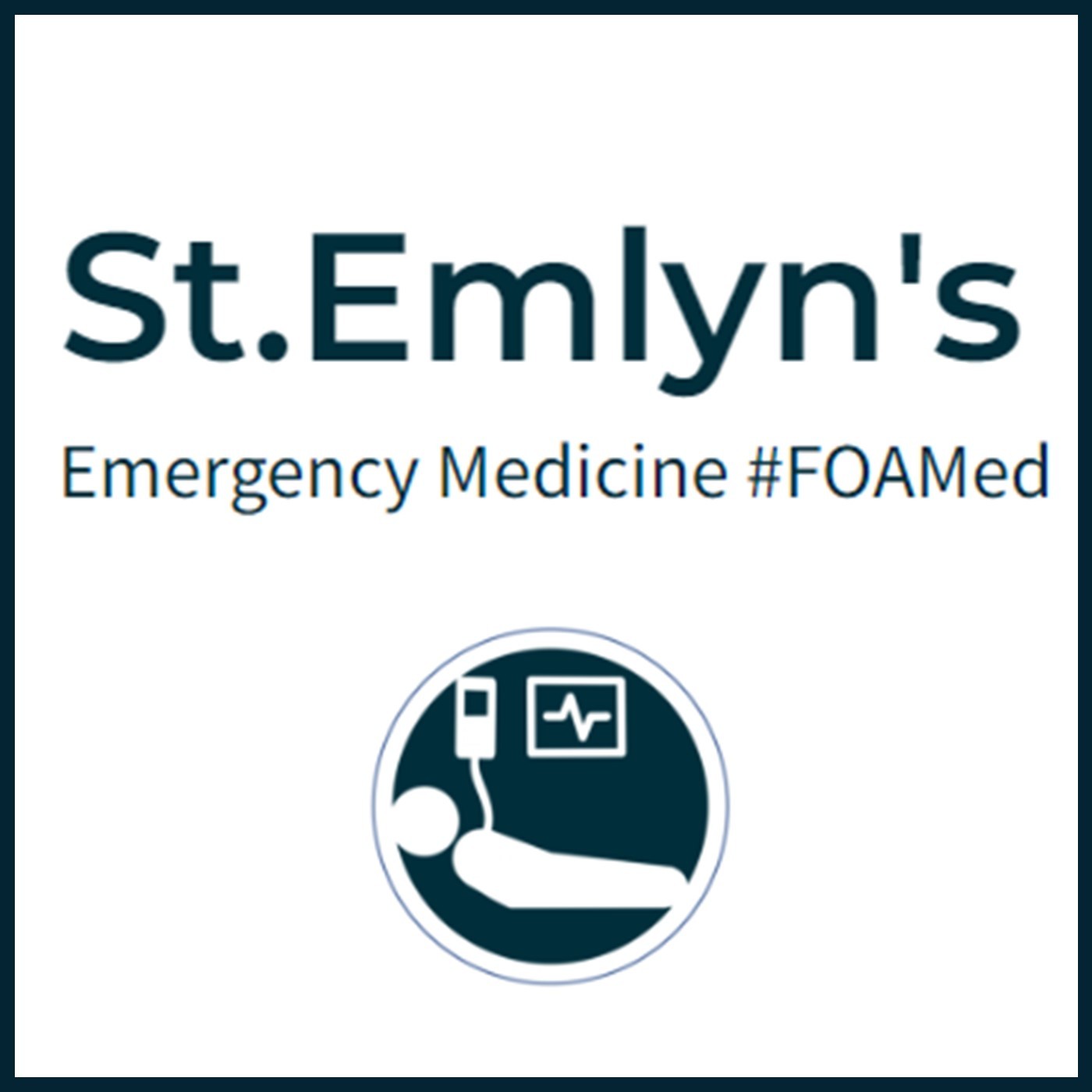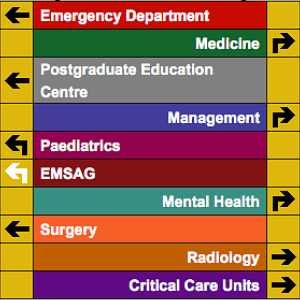
1.3M
Downloads
287
Episodes
A UK based Emergency Medicine podcast for anyone who works in emergency care. The St Emlyn ’s team are all passionate educators and clinicians who strive to bring you the best evidence based education. Our four pillars of learning are evidence-based medicine, clinical excellence, personal development and the philosophical overview of emergency care. We have a strong academic faculty and reputation for high quality education presented through multimedia platforms and articles. St Emlyn’s is a name given to a fictionalised emergency care system. This online clinical space is designed to allow clinical care to be discussed without compromising the safety or confidentiality of patients or clinicians.
Episodes

Wednesday May 01, 2019
Ep 135 - April 2019 Round Up
Wednesday May 01, 2019
Wednesday May 01, 2019
St. Emlyn's April 2019 Podcast Highlights
Hello and welcome to the St. Emlyn's blog. I'm Simon Carley, and today I'll be sharing the exciting developments from April 2019 on our St. Emlyn's blog. This month has been packed with insightful posts and groundbreaking research, so let's dive in.
Andromeda Shock Trial: A New Perspective
We begin with a thought-provoking journal club post by Dan Horner, an intensivist and emergency physician, who explores the Andromeda Shock trial. This study, conducted in Argentina, compared two resuscitation strategies for patients with septic shock: targeting lactate levels versus peripheral perfusion as measured by capillary refill time.
The Andromeda Shock trial is fascinating because it challenges our reliance on measurable indicators like lactate levels. Many experts argue that lactate doesn't provide the information we think it does about sepsis. Rich Carden's excellent blog on lactate delves into this topic, explaining why the common assumption that lactate indicates anaerobic metabolism is incorrect. Insights from leading intensivists like John Mayberg and Simon Finfer prompt a reevaluation of how we interpret lactate levels.
In the trial, patients managed using peripheral perfusion monitoring showed better outcomes than those managed by lactate levels. Although the trial is underpowered to show definitive differences, the findings suggest that both methods are likely similar in effectiveness. This study highlights the need to reconsider our approach to monitoring septic shock patients and suggests that capillary refill time could be a valuable, low-cost alternative to lactate measurement.
Enhancing Learning with Minimal Effort
Next, we turn to an intriguing blog by Nick Smith, who shares a lazy yet effective way to enhance learning. Inspired by Matthew Walker's book "Why We Sleep," Nick discusses the critical role of rest in learning and retention. The key takeaway is simple: if you're not well-rested before and after learning, you won't retain information effectively.
Nick emphasizes understanding individual learning rhythms. Some people, like early risers, learn best in the morning, while night owls perform better later in the day. This insight is crucial for medical educators and learners alike. For instance, teenagers naturally have later sleep cycles, making early morning learning sessions less effective.
Walker’s book provides compelling evidence on how sleep affects cognitive function and memory consolidation. During sleep, particularly REM sleep, the brain processes and organizes information learned throughout the day. Lack of sleep disrupts this process, leading to poorer retention and understanding.
Nick integrates these scientific insights with practical advice, making his blog an invaluable resource for optimizing learning strategies. He offers tips on improving sleep hygiene, such as maintaining a consistent sleep schedule, creating a restful environment, and avoiding stimulants before bedtime.
Nick also highlights the impact of disrupted sleep patterns, especially when attending international conferences. Jet lag and lack of sleep can severely hamper your ability to absorb new information. Moreover, alcohol consumption negatively affects learning, which is worth considering during conference social events.
Nick's post is packed with practical tips and impressive infographics that make the information easily digestible. It's a must-read for anyone involved in medical education or looking to optimize their learning strategies.
Aortic Emergencies: Key Insights from George Willis
George Willis, a renowned speaker and former professional American football player, presented on aortic emergencies at the St. Emlyn's Live Conference. His talk is a goldmine of information for emergency medicine practitioners. Aortic emergencies, such as ruptured aortic aneurysms and dissections, are critical conditions that require swift diagnosis and management.
George emphasizes using clinical history and tools like ultrasound to diagnose aortic emergencies. For example, ultrasound can identify abdominal aortic aneurysms and dissections via transthoracic echo. He also discusses managing these patients, particularly those with dissections, who present unique challenges due to their unstable blood pressure.
One notable case George describes involves managing pericardial effusion and tamponade resulting from aortic dissection. Techniques like pericardiocentesis can be life-saving, buying valuable time for definitive treatment. George's practical tips and real-world examples make his presentation an invaluable resource for anyone dealing with aortic emergencies.
Managing aortic emergencies requires a nuanced approach, particularly when dealing with unstable patients. George discusses using medications like labetalol for beta-blockade and alpha-blockade to manage blood pressure in dissection patients. These medications help reduce the strain on the aorta without compromising patient safety.
George also covers using imaging techniques, such as CT angiography, to confirm diagnoses and plan interventions. The ability to quickly and accurately diagnose these conditions is crucial for timely surgical intervention, which can significantly improve patient outcomes.
Ambulatory Care for PEs: Dan Horner's Expert Insights
Dan Horner returns with another insightful blog, this time on the ambulatory management of pulmonary embolisms (PEs). At the Arkham conference in Belfast, Dan discussed the benefits and challenges of treating PEs as outpatients. His post is a comprehensive guide to identifying which patients can be safely managed at home and which require hospital admission.
Dan explores various prognostic factors and scoring systems, such as PESI and sPESI, used to predict complications in PE patients. While these scores are better than Gestalt, they are not without limitations. Dan also touches on biomarkers and their role in predicting PE outcomes, though current data is not definitive.
Identifying patients who can be safely managed on an outpatient basis is crucial for optimizing resource use and improving patient comfort. Dan discusses the criteria for outpatient management, including the absence of hemodynamic instability, low bleeding risk, and adequate home support. These criteria help ensure that only patients with a low risk of complications are selected for ambulatory care.
Treatment options for PEs are evolving, with a shift from traditional anticoagulants like Warfarin to NOACs/DOACs. While these newer agents offer convenience, the evidence base is still developing. Dan also addresses the complexities of managing PEs in special populations, such as pregnant patients, highlighting the need for individualized care and informed discussions with patients.
Implementing ambulatory care for PEs requires careful planning and coordination. Dan provides practical advice on setting up ambulatory care pathways, including patient education, follow-up protocols, and the use of telemedicine to monitor patients remotely. He also discusses the importance of multidisciplinary collaboration in managing these patients.
Dan's blog is a treasure trove of resources, including guidelines for outpatient management, risk scores, and follow-up strategies. It's an essential read for anyone involved in the care of PE patients, offering the latest evidence and practical advice.
Coping with Clinical Tragedies: Liz Crowe's Personal Journey
To conclude our April roundup, we have two deeply moving blogs by Liz Crowe, where she shares her experiences of dealing with clinical tragedies. Liz's candid account of a recent tragic event in her professional life resonates with many healthcare professionals who have faced similar situations. Her blogs not only describe the emotional impact of these events but also offer strategies for coping and recovery.
Liz's first blog delves into the profound emotional toll that clinical tragedies can take on healthcare providers. She describes the initial shock, feelings of guilt and helplessness, and the long-lasting impact on mental health. These experiences are not uncommon in the medical field, where the stakes are high, and the outcomes can sometimes be devastating.
Liz emphasizes the importance of acknowledging and processing these experiences, rather than burying the emotions. She provides practical advice on how to support yourself, your colleagues, and your loved ones during such challenging times. Liz's insights are invaluable for anyone in the healthcare field, offering guidance on how to navigate the emotional aftermath of clinical tragedies.
In her second blog, Liz focuses on strategies for coping with and recovering from clinical tragedies. She highlights the importance of seeking professional help when needed, whether through counseling, peer support groups, or other mental health resources. Liz also emphasizes the value of self-care practices, such as exercise, mindfulness, and maintaining a healthy work-life balance.
Liz shares her personal journey of recovery, including the support she received from colleagues and the strategies that helped her regain her confidence and resilience. Her story is a powerful reminder that, while clinical tragedies are deeply challenging, it is possible to heal and continue to provide compassionate care to patients.
Liz's blogs also underscore the importance of building a supportive community within the healthcare profession. She advocates for open conversations about mental health and the emotional challenges of medical practice, fostering an environment where healthcare providers feel safe to share their experiences and seek help.
Liz's blogs are a must-read for anyone who has experienced or is supporting someone through a clinical tragedy. They offer hope and practical strategies for healing and moving forward.
Final Thoughts
April 2019 has been an incredibly insightful month on the St. Emlyn's blog. From groundbreaking research and practical medical education tips to deeply personal reflections on clinical tragedies, we've covered a wide range of topics. Each post offers valuable insights and practical advice for healthcare professionals.
As we continue to face the challenges of a busy emergency department, it's crucial to stay informed and up-to-date with the latest evidence and best practices. Whether you're managing septic shock, improving your learning strategies, diagnosing aortic emergencies, treating PEs, or coping with clinical tragedies, the St. Emlyn's blog has you covered.
The diversity of topics covered this month highlights the importance of continuous learning and adaptation in emergency medicine. By staying abreast of the latest research and best practices, we can ensure that we are providing the highest quality care to our patients.
Thank you for joining us on this journey through April 2019. We hope you find these posts as enlightening and helpful as we do. Stay tuned for more exciting updates and insights from the St. Emlyn's team. Enjoy your emergency medicine practice, and we'll speak to you again soon.

No comments yet. Be the first to say something!